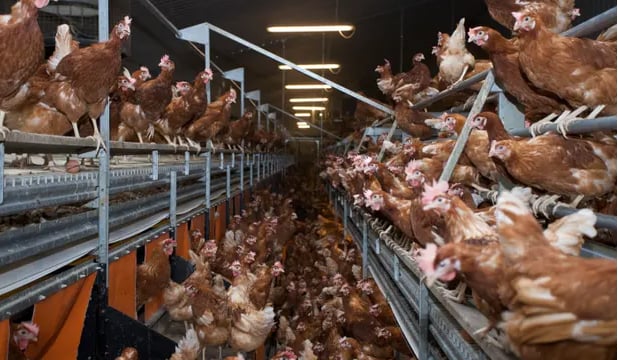May 17, 2025 | 05:27 GMT +7
May 17, 2025 | 05:27 GMT +7
Hotline: 0913.378.918
May 17, 2025 | 05:27 GMT +7
Hotline: 0913.378.918

The CPTPP deal is due to be signed on 16 July, and campaigners are calling for a ban on eggs not produced to UK animal welfare standards. Photograph: Mark Henderson/Alamy
Battery eggs should not be sold in the UK as part of post-Brexit trade deals, animal welfare groups have said, as the government prepares to allow them to be imported.
As part of the new Comprehensive and Progressive Agreement for Trans-Pacific Partnership (CPTPP), ministers are expected to give the green light to battery eggs to be imported from countries including Mexico.
Many consider battery cages cruel as they confine an egg-laying hen to one cage, connected to other hen cages in a long row. They spend the majority of their lives in these systems, leaving them unable to exhibit normal behaviours.
The RSPCA has accused the government of a “race to the bottom for animal welfare standards” as conventional battery systems were banned in the UK in 2012. The CPTPP trade deal is due to be signed on 16 July, and campaigners are calling for the government to disallow eggs not produced to UK animal welfare standards.
David Bowles, the head of public affairs at the RSPCA, said: “If this deal is agreed, it will not only set our own egg producers at a disadvantage, it will also directly impact RSPCA standards on laying hens, which account for over one in two eggs produced in the UK. The government is starting the gun on a race to the bottom for our animal welfare standards.”
Egg products could be imported from countries such as Mexico, which relies almost exclusively on battery cages for egg production. Such imports would undercut British egg producers who operate to significantly higher standards of animal welfare under the British Lion code of practice.
Dr Nick Palmer, the head of Compassion in World Farming UK, added: “Without adequate tariffs to only allow imported eggs produced to UK standards, the doors will be wide open for powdered and liquid eggs from countries with lower or no animal welfare standards – this is not what UK consumers expect of our government, which promotes high standards of hen welfare, environmental protection and food safety.”
There have recently been concerns about the egg supply chain, after bird flu and costs caused farms to go out of business. From late last year, there were egg shortages in supermarkets, with some sourcing eggs from Italy.
The chief executive of the British Egg Industry Council, Mark Williams, said: “It is almost unbelievable that the government would let consumers down like this. Shoppers will be horrified to learn that eggs in their food products could soon be coming from battery cages more than a decade after they were banned here.
“To rubberstamp a deal which effectively sanctions the importation of eggs from conventional (battery) caged systems which are outlawed here is not only counter-intuitive, but it also completely undermines the countrywide standards that are adhered to by the UK egg industry. This particularly affects the egg products sector which could see the importation of low welfare eggs, whilst UK egg farmers rightly continue to invest in ensuring higher welfare standards for their birds.”
The CPTPP trade deal with Canada, Mexico and other countries has caused concern among animal welfare campaigners as there is also the possibility of low-welfare pork being imported. In Canada, there are more than 7,400 pig farms, and animal charities in the country say pigs there face castration, ear notching, tail docking and teeth trimming. Sows are kept for long periods in stalls that do not give them room to turn around, a practice banned in the UK. Pigs are also often left to live on cold, damp, slatted floors with no room for bedding or straw, the campaigners say.
A spokesperson for the Department for Environment, Food and Rural Affairs said: “We are committed to protecting high animal welfare standards globally, as the prime minister recently emphasised in open letter to British farmers. We have not lowered our food, animal welfare or environmental standards in order to accede to CPTPP and there have been no imports of eggs from CPTPP members to the UK since 2015.
“Global trade flows on shell eggs are minimal as it is not practical to trade shell eggs for human consumption over long distances and exports of egg products are not significant within the CPTPP membership.”
(The Guardian)

(VAN) Fourth most important food crop in peril as Latin America and Caribbean suffer from slow-onset climate disaster.

(VAN) Shifting market dynamics and the noise around new legislation has propelled Trouw Nutrition’s research around early life nutrition in poultry. Today, it continues to be a key area of research.

(VAN) India is concerned about its food security and the livelihoods of its farmers if more US food imports are allowed.

(VAN) FAO's Director-General emphasises the need to work together to transform agrifood systems.

(VAN) Europe is facing its worst outbreak of foot-and-mouth since the start of the century.

(VAN) The central authorities, in early April, released a 10-year plan for rural vitalization.

(VAN) Viterra marked a significant milestone in its carbon measurement program in Argentina, called Ígaris, reaching 1 million soybean hectares measured.